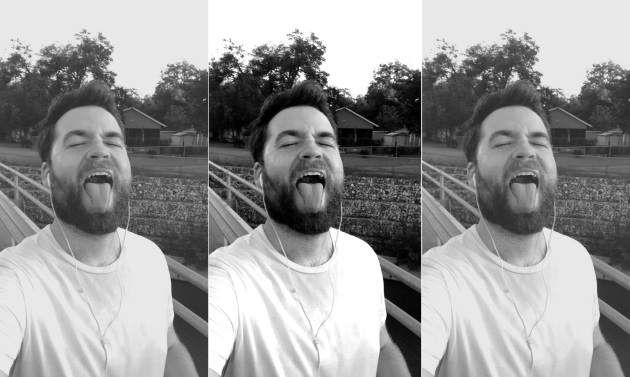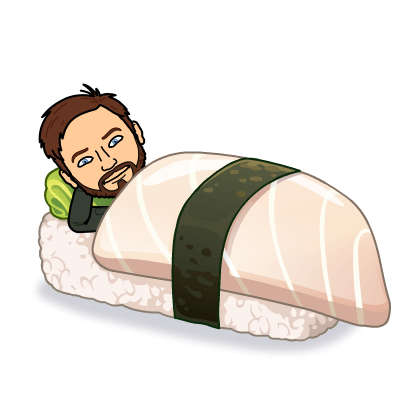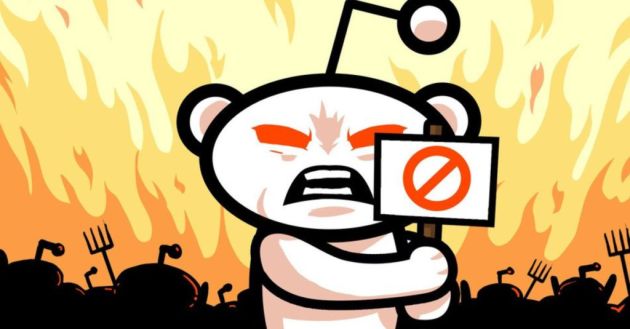
1.
Sometimes I don’t know who I’m supposed to hate. It can be a confusing emotion. That hate is human, however, that it is core to the experience, seems firmly established: Hate, as I see it, is the kneejerk reaction to rejected love, promises, beliefs, and realities. And who doesn’t have those?
Even if you despise that idea of hate (which could just be read as more proof of its existence), there’s still ‘hate,’ like we toss out the term now. He’s a hater. I hated that TV show. Fuck hating-ass Donald Trump. Him and his hater army should drink some haterade. You get the point.
That there’s all this hate floating around likely explains my own retreat into sports. My emotions needed somewhere to go and games create a sort of alternate reality for everyone to occupy. Within this context, it might seem perfectly reasonable to scream phrases like, “Die, die, DIE, you janky, long-neck mother fucker,” as five guys collapse onto an opposing star quarterback like, um, just for example, Peyton Manning. Or, in your sports safe space, it is not out of the ordinary to imagine delivering an iron crowbar to the knees of Paul Pierce (another star chosen at random) because you swear to God if he lazily baits one more bullshit foul you’ll stab the damn crowbar into your own eyeballs just to end the visual torture. All of this seems normal. It makes sense as heightened tribalism. An us vs. them attitude. That team is trying to stop ‘us’—who I love, who I believe should win, who represent my hopes, desires, dreams in a physical sense—so fuck them and everyone who fucks with them. Hating follows a logical explanation, not an emotional one.
This (should) complicate with age. You (should) develop some empathy and (should) realize it’s just a game, even it’s only after the fact. Because of my foray into sportswriting during my time at Florida State, this transformation happened without my realizing. The goal, as a writer, is to identify these athletes as humans ripe with potential and meaning, with stories. To see them not as players but as people. Experiencing these stories through longreads, an Outside the Lines piece, or just following these dudes’ Instagrams (should) have a similar effect. Not hating ends up following an emotional explanation, not a logical one.
2.
But it is not always this easy. Life, as much as some argue otherwise, is not sports. Again, in discussing hate, what I’m really describing is unresolved anger/frustration/turmoil/etc. Rational thought might lead one to seek a conquering of one’s self; that if one could accomplish this feat—and accomplish it perpetually as it’s a neverending war of sorts, considering life beats on endlessly and fresh problems appear throughout a lifetime—one might discover a fulfilling life. Hate, one realizes, taps into the same vein as love, birthed from the same chemicals and properties of it, and the expression of hate might stem from a lack of loving one’s self. So if one could learn to love one’s self, the problem might disappear.
Now that sounds like a lot of work. That “neverending war” bit? And really, “the problem might disappear”? So it’s basically a wash? Upon examination, that paragraph starts sounding like a lot of pleasant rhetoric masquerading as erudite philosophy. As if some 23-year-old stumbled upon ‘the secret’ and here it is up front for you. It could all really be that simple.
To which I say: Who knows? Maybe, probably not, possibly. Regardless, those are me and my thoughts. What I’m dealing with currently. I’m also realizing my broad explanation of hate might be like the 1B. definition, not the entire scope of the term. Thinking about it, hate has infinite possibilities.
3.
Bridge of Spies is a very good movie I did not expect to like. It follows Tom Hanks as James B. Donovan, an insurance lawyer assigned to defend Rudolf Abel, a recently captured Soviet spy. No one expects Donovan to argue valiantly on his behalf amidst the backdrop of the Cold War. His firm, friends, and family all but demand him not to. Instead he does and loses all the way to the Supreme Court. But then Francis Gary Powers, an American pilot on a secret U-2 spy mission, gets shot down and imprisoned in Soviet territory. Donovan receives backchannel messages requesting he negotiate an exchange to take place in East Berlin: Powers for Abel. The movie threads these narratives from there.
Tired subject matter (Cold War espionage) and its star explain my low expectations. I find Hanks’ acting too self-serious and self-regarding; he usually chooses roles where he represents some virtue inherent to living as a paragon. He always plays the Good Guy. It’s not that compelling to me is all.* Hanks doesn’t sway too far from that guy in Bridge of Spies.
* Whenever a director attempts to undercut this persona, though, it’s rather intriguing. Like in the Toy Story movies where Hanks voices Woody. The point of that character is that he takes himself too seriously, is too needy for glory. Every Toy Story movie reminds us we’re not always meant to play the hero in our story, we’re not always to be regarded as ‘special.’ Meanwhile, Cast Away might be the funniest unintentional comedy ever made, as everyone who has screamed “WILLSSSOONNNNNNN!!!!!!” at a volleyball recognizes.
It’s been a critical darling, though. Before its Oscar nominations it had underground buzz. Steven Spielberg’s directing is gorgeous, conveying emotional notes and narrative dynamics through every shot; it’s extremely motivated filmmaking, really. Mark Rylance’s performance as Abel certainly elevates the picture.
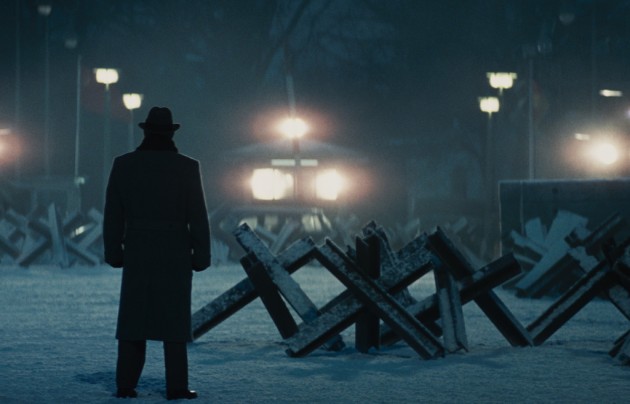
This is not why it’s been a popular movie, if I had to guess. In the mainstream but also for the critics and cinephiles. It’s about this mix of nostalgia and coherence. You understand the ‘villains’ and their motivations: East Germany, USSR; socialism, totalitarianism, erasure of America’s influence and ideals. Not knowing this history and these enemies is simply not allowed growing up a certain age. Teachers, grandpas, aunts, family friends repeat stories also seen in the film: practicing hiding under school desks, or filling bathtubs with water, a resource that’d be lacking in case of nuclear fallout. This too was Spielberg’s childhood. “It’s as close to my life as you can get,” Spielberg has said.
Back then, it was no mystery who drew our ire. Tribalism lines were sealed with concrete blocks topped with razor wire: Americans vs. Russians; freedom vs. socialism. When I watched Bridge of Spies, I could feel the audience relax a little, sigh some relief. It was all so comforting knowing who we were supposed to hate.
4.
Everyone’s always trying to save the world in movies. Probably because someone always wants to destroy it. Those are the stakes in big blockbusters anyways. I mean, how many cities sieged, how many nuclear launch codes stolen, how many loved ones kidnapped, how many apocalypses, how many secret chemicals with weird names, how many planet-ending devices stashed in dubious safes, how many radioactive spiders, how many dead presidents, how many alien invasions, how many mechanized robots evil and good can there really be? At what point do the fear of these threats dissipate a little bit?
I’m not complaining. I’m not. I love this popcorn garbage. I’m just identifying trends and why it’s interesting when new ones develop. It’s almost a way to stock whatever we as a culture fear most. Then, to alleviate that fear, our hero conquers it. For example, following 9/11, it was quite vogue for filmmakers to annihilate mid-town Manhattan. Avengers famously did it. I Am Legend did it. The Day After Tomorrow, Cloverfield did it. That strange Nic Cage movie Knowing felt rather explicitly about the guilt and fear that swept the country post-9/11.
That’s (mostly) over, though. I mean, directors still like blowing up the planet and that will never change. But new threats, in a globally dependent economy, in a world where attacks are perpetrated by jihadist groups not countries, in a time when more people are more connected than ever before, are more insidious. Or maybe blockbuster sequels have run out of ideas. Both explanations are plausible.
Look at something like Furious 7, a movie in which I did not cry when that Wiz Khalifa song started and Brian teases Dom for trying to leave without saying goodbye and that Paul Walker FF montage plays and Vin Diesel states they’ll always be brothers and their roads diverge and … no tears at all.
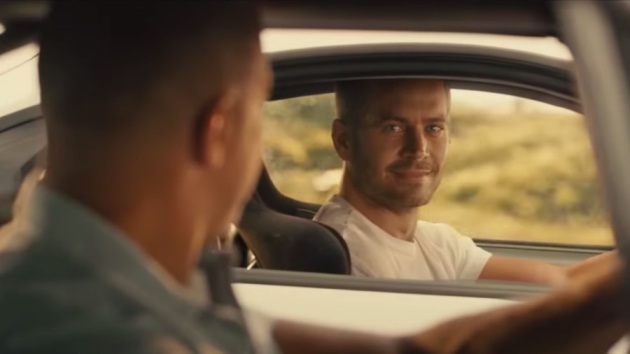
But the film’s plot. It revolves around a program called God’s Eye, a software that utilizes every smartphone and camera worldwide along with facial recognition technology to track individuals. The team acquires God’s Eye, uses it to track their villain, loses it to the villain, and ultimately destroys it to defeat the villain. (Then that emotional stuff happens.)
A similar technology presents itself in James Bond: Spectre. The 00 espionage program, and James Bond, have been deemed obsolete. C, the head of the private Joint Intelligence Service, aims to push Britain into “Nine Eyes,” a joint surveillance operation including nine first-world countries. It’s revealed Spectre, an underground terrorist group Bond has been tracking, instigated attacks to convince waffling countries they needed “Nine Eyes.” In exchange Spectre would be given unfiltered access to the program. Bond, of course, stops all this from happening and saves the day. The 00 program continues. “Nine Eyes” does not.
Mission: Impossible—Rogue Nation has an identical plot (although it’s a much better movie). Ethan Hunt believes a secret criminal group called the Syndicate exists, though, like Bond in Spectre, no one else does. And like Bond, an outside CIA man believes Hunt’s organization, the Impossible Missions Force, should be disbanded and succeeds in absorbing it into the CIA. Hunt eventually learns through his mission-impossibling the Syndicate was real and created by the British government to track and destroy enemies without detection or accountability. But the Syndicate went rogue and the government can no longer control it. They tried to cover it up but can’t. A big plot point involves Tom Cruise’s risky business in the field (a meta joke I appreciated). To prove everyone wrong, Cruise gambles and captures the Syndicate leader. He wins. Secret government courts reinstates the IMF, recognizing the importance of individuals in the field. Monitoring countries uninhibited and the Syndicate influencing change unreported ceases.
So. The movies aren’t really feeling mass surveillance, huh?
5.
Emotions are short-term solutions. They are episodic responses of fluctuating neurochemicals responding to stimuli. They are fleeting. You pull weeds in a garden and a snake pops out. Your grandmother says something racist at Thanksgiving. You eat bacon. You overhear some skank make insinuating comments to your boyfriend. Emotions are involuntary reactions to fix an immediate problem.
In some ways, they can betray you. Without your doing, emotions show up on your face all the time. This is because humans used to be stupid (and some still are). Facial tics stem from paleocircuitry within your brain, where most nonverbal communication is stored, back when we lacked verbal skills. Because we couldn’t say it, our face had to communicate for us. I’m happy. I’m scared. I’m disgusted. I’m sad. I’m angry.
I had a public speaking professor at FSU who I remember saying, quite frequently, that 70 percent of communication is nonverbal. This, I learned, is a wildly disputed figure. Most numbers stem from two studies conducted by Dr. Albert Mehrabian in 1967. We’ll skip the details, but he concluded this oft-repeated and misrepresented figure of 55/38/7. Those numbers indicate factors of communication: 55 percent equals body language, 38 is tone, and 7 are the words actually spoken. But Mehrabian only intended those numbers to be context-specific, in which the messages relayed via nonverbal and verbal channel are incongruent. For all other communication, those might not be the precise figures.
But the specifics are irrelevant. Let other people worry about the exact numbers. What matters is the idea behind them: That a significant portion of communication occurs nonverbally. How eyebrows pinch or high-pitched a voices rises or breaking eye contact during a crucial confession. It’s an idea we all agree upon without ever really saying it.
This is what most technophobes fear about the Internet and smartphones. That we lose something crucial to human experience and communication as we exist more and more in these channels. But these people also ignore how conservation has evolved in digital spaces. We #invent ways to *~express~* $h!t and how we reeeeeaalllly mean it :).
Between two people, communication in the digital age hasn’t changed. No different than writing letters. In some ways, I’d argue it’s better. Hyperlinking, sending memes, GIFs, instantaneous delivery. Screw a To My Dearest Abigail, have you ever received any cute cat GIF ever? Brightens your whole week.
The caveat: Social media changes the equation. When critics invented “mass communication” as a term, it only ever meant one sender to millions of receivers. But social media inverts that: One receiver to billions of senders. It is like being thirsty, finding a water fountain, pushing a button, and four waterfalls rain overhead. Not only is it your job to drink, but you also must find the streams of quality water. Because tons of people are plain shitty communicators.
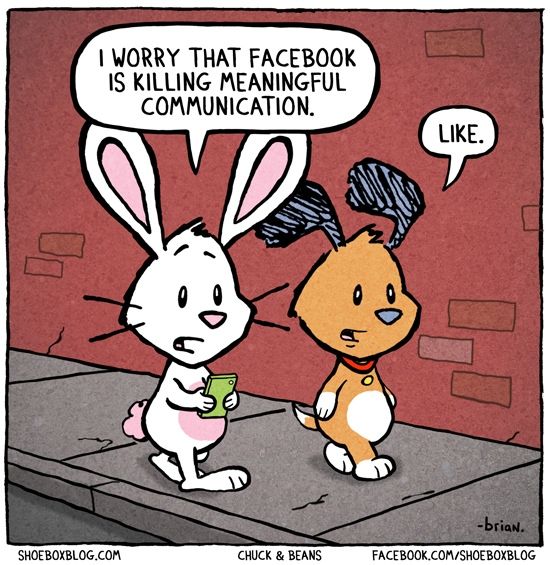
6.
Any conversation involving mass surveillance circles back to Edward Snowden so instead let’s just start there. To recap: Snowden is the infamous NSA whistleblower who leaked numerous documents to journalists revealing the breach of privacy governments around the world break to collect information on individuals. The main culprits are, but not limited to, Australia, New Zealand, Canada, the United Kingdom, and United States. They comprise “Five Eyes,” or FVEY*, who circumvent domestic law and spy on each other’s individuals, sharing that intel amongst one another. It’s kind of terrifying to consider what they do and don’t have on you. This is why I don’t send dick pics.**
*Yes Spectre assuredly stole that name for its fake “Nine Eyes” organization and why that movie stunk: It wasn’t trying to be a James Bond movie; it was trying to be a mass surveillance movie.
**Among other classified reasons…
Snowden also (sort of) starred in the best thriller picture I’ve seen in years: Citizenfour. The documentary details the account of Laura Poitras and Glenn Greenwald (then later Ewen MacAskill) meeting Snowden in a Hong Kong hotel where he plans to leak the aforementioned documents to them. Paranoia haunts them as they fear US and UK governments seem to be on their tail. To be fair, weird shit happens: at one point a fire alarm rings on and off, almost as a bait to force them out of their protected hotel room. When Snowden calls the front desk, they inform him it was just a test.
That countries spy on each other is nothing new. Information is invaluable. This becomes more so as individuals’ impact lessens and technological advancements’ increases in the battlefield. A character in Bridge of Spies literally says this: “We are engaged in a war. This war does not for the moment involve men at arms, it involves information.”
Appearance has changed as well. Spies no longer look or act like Vin Diesel or Daniel Craig or Tom Cruise or even freaking Austin Stowell; they look like Edward Snowden. They are Edward Snowden. And he is not cool. He is a dork. A very, very intelligent dork I respect immensely, but a goddamn dork nonetheless.
What mass surveillance means as a violation of our citizenry is not very interesting. The answer is simple: It just is. To steal from Snowden, saying you don’t care about mass surveillance because you have nothing to hide is identical to saying you don’t care about free speech because you have nothing to say. Rights and results remain separate influences in determining policy.
Behind both ideas, however, lies motive. It’s easy to understand those who support rights: Individual freedom protects a democratic people from the unstoppable power of a tyrannical government. Activist groups often stretch this idea to unnecessary means, losing their shit upon any perceived infringement of those rights, say, background checks for gun purchases. That isn’t always a bad thing, but also like chill.
If you asked officials and supporters of increasing mass surveillance, their answer would point to stopping terrorist threats like the recent Paris attacks from happening again. You get the sense these people truly believe in a Minority Report world, where crime becomes foreseeable and stopped before it ever happens. They wish for a secure existence against outside threats. They wish that our country just might be safe. But I think that’s only half the truth.
“When they use the word security, they’re not talking about safety. What they’re talking about is stability,” Snowden said. “Like when they’re saying they’re saving lives by bombing them. Stability is the highest value. It’s not about freedom, it’s not about liberty, it’s not even about safety. It’s about avoiding change. It’s about ensuring things are predictable, shapeable, because then they are controllable.”
Now that I can understand. I see why people believe in it.
7.
My friend called me a disease the other day. It was one of those friendly pokes disguising a truth. Like all millennials, we participate in a friends-group message.* Some days it’s popping, other times it goes ghost. Even in interpersonal texts, it’s how we communicate. Days pass in between responses and no one’s insulted by it.
*If you’re over 32, it’s just called Slack.
My friend explained this was my fault. At some point in college, I started communicating like that, and over time it infected everyone else.
He’s not wrong. That is my preferred style of texting, emailing, what’s apping, etc. Admittedly, this is pretty abnormal for a millennial Internet kid. I’ll borrow a new friend’s phone, taking a picture or whatever, and message notifications run nonstop. Anxiety creeps in and I can’t wait to pass it back. I don’t need more waterfalls overhead.
It seems to only be increasing, too, as no one’s part of just one group either, myself included. Text after Instagram like after GroupMe alert after email buzz after Twitter follow, the notifications never stop.
Now being the semi-shitty aloof communicator I am hurts me. Not even as means to breakthrough as a writer, or a ‘creative’ or whatever moniker, and gaining attention, but a as human being who values intimate relationships the older I get. My lack of responses might be explained in simple terms: I don’t have anything to say or I haven’t formed an opinion yet.
But that’s not true. Honestly, I just feel too busy most times. Not an hour passes where I don’t believe I should be accomplishing something productive with my time. This leads to more anxiety of what should I accomplish then and sometimes a debate rages internally with both sides delivering equally compelling points and an hour’s gone and I’m checking Twitter again and reading Kardashian Wikipedia pages because damn that’s a fascinating history and a couple more hours pass and I still haven’t done anything. So then I feel I lack enough minutes to spend keeping up with friends and I don’t. This is not a healthy existence.
Time has become a perpetual micromanagement of evaluating what is and isn’t worthwhile. As I’m on my phone, friends texting and DJ Khaled snapchats and Bernie Sanders’ tax reforms all blend together as equal parts of this machine. Usually, DJ Khaled snaps win out because who doesn’t want to know the pathway to more success? Probably some bing bong like Paul Pierce because he’ll just foul his way there.
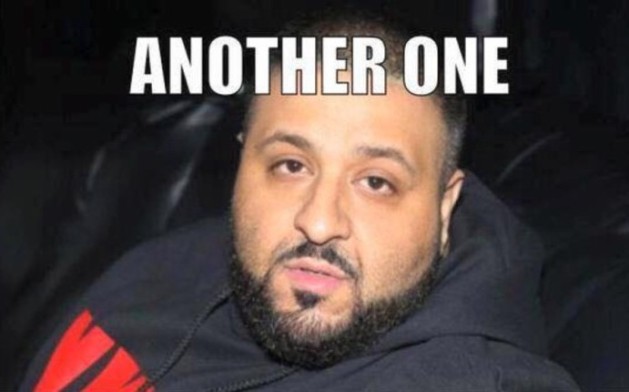
8.
What I hate is not knowing how everyone else feels. I mean, everyone sure seems eager to tell you what they hate, but I never believe it. Not on “the Internet”*, anyways. Most times, someone says or writes something (slightly) inflammatory, it catches the wave, and soon everyone’s crashing over everyone to ride it. It’s almost like a game: Who can torch the trending topic the quickest or loudest or funniest?
*The Internet= blogosphere, ‘online magazines,’ and Twitter. The greatest trick that group ever enacted is re-branding themselves as “the Internet.”
Most times, this mob rage distills down to a) a perceived infringement upon one’s rights to identity or b) an opportunity to extend a brand. Joining a social cause has sadly become the trendiest act a millennial can perform. It means you’re part of something. It means you’re Good. It means you’re #important.
Which is fine. I enjoy being those things, too. Any young person does. That’s why we’re the lost generation or the unknown generation or the “me” generation, as if no other generations in the past century have been either. (Hint: They were all one of those.) Unlike others, we have a “voice” in social media. We can place thoughts, feelings, selfies into the world and for whatever reason people pay attention. We can point to proof of our existence.
But I’m not sure it’s helped anything. No topic seems as confusing as identity currently is for young people, except maybe why white people love Peyton Manning so much.* And I think it starts with this constant deluge of information piling on our heads every day. There’s about 17 news bits you should either care or know about and that’s just when you wake up. The information, it doesn’t stop. And don’t forget the wealth of history elders repeat you don’t know enough about. And don’t forget that so many historical narratives are tangled in bias and shaded coloring of half-truths you must read a dozen nuggets of articles and possibly a book just to encapsulate a big picture of the thing. Which just returns us to the central dilemma: What am I supposed to think? How am I supposed to feel? Who am I supposed to believe or trust?
*Okay I’m done.
This constant processing of information forces these perpetual critical evaluations of the self. It’s like being asked the big question numerous times with slightly different wording: Who am I? Because you must know that before answering and understanding everything else. But that’s assuming you live a conscious existence where you’re even wondering about all this crap. I get why most don’t. Some people just prefer believing the Matrix is real.
I have this fun trick I like to play whenever someone delivers a CAPS-LOCK screed online. Every time they declare they “HATE” someone or insists someone has gone too far and we should all be upset about it, I change their words to either “I wanna be needed!!” or “I’m alone.” I realize that trivializes things, but it’s my defensive mechanism from overloading on all the rage. We’re all just trying to get by in our own ways, really.
Because, really, we put ourselves out there too much, often exposing ourselves in potentially harmful ways, because deep down we’re just scared. It’s why we create these enemies just to beat them down. It validates us. It proves we have purpose. Or something like that.
Great. I’m back to the start of this whole dilemma: Hate is a misguided feeling and motive as any other. Sometimes we hate socialists, other times (kind of) ignorant celebrities, technology, and also ourselves. Everyone’s pretending to know who they hate or the why of it. We’re all just confused about it as we ever were.
So I’m picking an enemy at random to funnel our meandering rage and I choose penguins. I don’t trust those beaky, tuxedo fuckers. Who wants to look classy all the time? Are you trying to say you’re better than me, penguin? I swear, if we don’t instill anti-legislation they’ll ruin this country yet. Join me in the new war against penguins. We can all be in this together.
